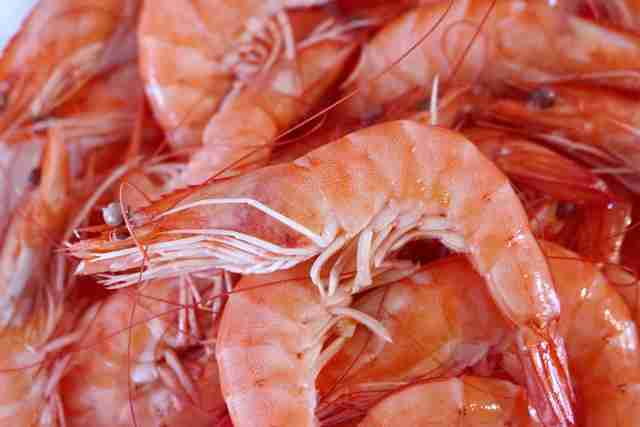Do Shrimp Feel Pain? (REVEALED!)
Shrimps are a popular crustacean delicacy in different cultures. They can be frozen, fried, boiled, grilled, and even roasted. When you consider how they are prepared, it’s not uncommon to wonder if they really feel pain.
Shrimps lack backbones, which makes them invertebrates, and so they do not share many characteristics with humans and other vertebrates. Let’s explore how pain is detected and processed in shrimps.

Do shrimp feel pain?
There is evidence showing that shrimps can respond to painful stimuli. This means they feel pain to some extent. They avoid conditions that are capable of causing them pain. However, it’s not clear if they interpret pain the way humans and other vertebrates do.
How do we measure pain in shrimps?
There is no particular way to measure pain. Physical Pain is quite difficult to measure. Notwithstanding, different behavioral responses to painful stimulation, like a reflex, can give an insight into how much pain a shrimp is experiencing.
First stage: contact
When an animal is exposed to painful stimuli, a “message” is sent to the central nervous system through a network of neurons. The message is translated and communicated back to the body part affected to withdraw from said stimuli. This withdrawal is seen as a reflex action, and the whole process happens very fast.
Second stage: response
As shellfish, shrimps process pain much faster than vertebrates. And that is because they have a very simple nervous system, so the time it takes for the nervous signals to get to the pain receptors is much shorter. This means it’s possible the whole process starts and stops before the shrimp is even able to register the pain.
Many scholars believe that the mere fact an animal responds to pain is not enough evidence that it does feel pain. However, the lack of evidence doesn’t mean we should dismiss the possibility of suffering in shrimps.
In shrimps specifically, certain neurochemicals called opioids are created when they feel particularly stressed. It is believed that these opioids may help to moderate pain, similar to what happens in humans and other vertebrates. But there’s no evidence to show that opioids are indeed natural painkillers as there’s still no developed method to measure suffering.
The phenomenon doesn’t only occur in shrimps but is also common with other crustaceans.
Do shrimp feel pain when frozen?
The popular practice in the food industry is to freeze shrimp rapidly. This could damage their cells and tissues and induce physiological stress. When this happens, it may affect the way the nervous system transmits signals, including pain, to the brain. It is still possible that the shrimp still experience some form of distress in that state before the nerves are damaged beyond repair.
Do shrimp feel pain when boiled?
When a shrimp is thrown in a pot of boiling water, it can be seen thrashing and squirming about. This is a reflexive behavior and could be interpreted as a kind of distress response. As opposed to cold situations, shrimps respond violently to hot water.
Dropping a shrimp in hot water does not kill them instantly. Hence, they feel the effect of the hot water for a while before they die.
Do shrimp feel pain when they die?
Most biologists believe shrimps are not capable of experiencing suffering or pain since they have a very limited nervous system. This also applies to many simple invertebrates.
Having said that, whether or not shrimps experience pain when they die is not fully understood. What we know is that they often show aversive behaviors to situations that may lead to their demise.
Do shrimps have nerves?
Shrimps do have a peripheral nervous system, which means they have nerves. They have clusters of nerve cells called ganglia distributed across various parts of their bodies. The central nervous system is not located in their heads, but it exists as a nerve cord that runs down their backs.
In general, the nervous system is less complex than the ones found in mammals. Nonetheless, they also possess sensory receptors that help them detect environmental stimulations, including pain.
Each ganglion receives information from other parts of the body, including the body wall, muscles, and swimmerets.
Do shrimp feel fear?
There’s not much evidence that suggests that shrimps do feel fear. However, from observing them, one can notice some fearful behaviors.
Some shrimp species have been observed to “run away” when they find themselves in potentially harmful situations. They are also likely to avoid situations or conditions in which they have been previously harmed.
A shrimp that has been injured by what seems like a sharp object in the sea bed tends to avoid the same area where the object is. This could be translated as fear if it was a higher animal, but there isn’t much evidence to show that it is not just instinct in the case of shrimps.
Compared to higher animals which are known to experience fear, shrimps have a simpler nervous system and cognitive ability. But it is still not evident if they behave in this manner due to fear or simply instinct or reflex.
So, yes, shrimps are sensitive to threats, but it is not clear whether their reaction can be perceived as “fear.”
Do shrimp feel emotions?
Not much is known about shrimps and their sentience. This includes their ability to feel emotions. Their very simple nervous system could mean they are not capable of complex emotional responses.
It is difficult to determine if shrimps feel emotions based on their behavior. This is because it is believed their behavior is largely due to instinct and reflexes.
Do brine shrimp feel pain?
Artemia, or Brine shrimp, are inhabitants of brine pools or water bodies with very high salt content. They do not look very much like the typical shrimp and are tinier. They also have a simpler nervous system.
As you would expect, brine shrimps do not feel pain in the same way as humans do. In fact, there isn’t a lot of evidence showing that they feel pain at all, despite having a nervous system and sensory receptors.
What we do know is that they respond to noxious stimuli. This can be seen when they take in more oxygen or have an increased heart rate. They may also avoid certain spots or predators.
Conclusion
To conclude, it is not clear whether shrimps feel pain like humans. If we are to go by the old argument by scientists, then the reasoning is that crustaceans generally don’t experience pain even when they are cooked alive.
This might be the case when you consider the fact that pain is a combination of nociception and suffering. However, since there’s no way to measure suffering, this argument has not been proven to be valid.
What we do know is that shrimps and other crustaceans respond to harmful stimuli. When you combine this with the fact that they secrete opioids when stressed, then it’s possible they experience pain to some degree.
Also, according to evolution, animals can feel pain as a means of self-preservation, not just humans!






